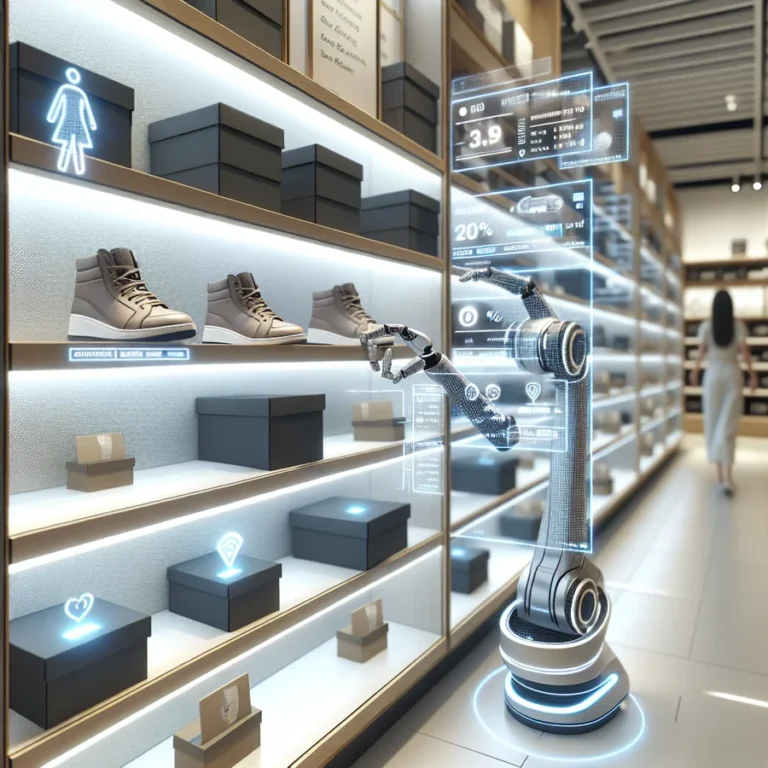AI in Supply Chain: Enhancing Efficiency and Reducing Costs
In today’s fast-paced business world, supply chain management is more critical than ever. Companies are constantly looking for ways to meet customer demands and cut costs. Artificial intelligence (AI) is emerging as a powerful tool to optimize supply chains, offering solutions to automate tasks, analyze data, and make smarter decisions. This guide explores how AI in supply chain is revolutionizing operations, leading to increased efficiency and significant cost savings.
This guide will explore the key applications of AI in supply chain, offering real-world examples and practical insights. We’ll delve into how AI is transforming everything from demand forecasting to logistics, helping businesses stay competitive and responsive in today’s dynamic market.
Understanding the Role of AI in Modern Supply Chains
The modern supply chain is a complex web of interconnected processes. It involves everything from sourcing raw materials to delivering finished products to customers. Managing this complexity efficiently is a major challenge. AI in supply chain offers a way to streamline these processes, making them faster, more accurate, and more cost-effective.
AI isn’t just about automation; it’s about using data to make better decisions. AI algorithms can analyze vast amounts of data, identify patterns, and predict future trends. This allows businesses to optimize their operations in ways that were previously impossible.
Key Applications of AI in Supply Chain Management
AI is transforming various aspects of supply chain management. Let’s explore some of the most impactful applications:
Demand Forecasting with AI
Accurate demand forecasting is essential for effective supply chain management. Traditional forecasting methods often rely on historical data and manual analysis. This can lead to inaccuracies, resulting in stockouts or excess inventory. AI in supply chain can improve demand forecasting by analyzing a wider range of data sources, including:
- Historical sales data
- Market trends
- Economic indicators
- Weather patterns
- Social media sentiment
By considering these factors, AI algorithms can generate more accurate demand forecasts. This helps companies optimize inventory levels, reduce stockouts, minimize overstocking, and improve customer satisfaction. For example, Walmart uses AI to predict demand for seasonal products, ensuring they have the right inventory at the right time.
Inventory Management Enhanced by AI
Efficient inventory management is crucial for minimizing costs and maximizing customer service. Holding too much inventory ties up capital and increases storage costs. Holding too little inventory can lead to lost sales and dissatisfied customers. AI in supply chain can optimize inventory management by:
- Analyzing real-time inventory data
- Predicting demand fluctuations
- Identifying optimal stock levels
- Automating replenishment processes
AI-powered tools can analyze inventory data to identify slow-moving items, optimize warehouse layouts, and automate reordering processes. This helps businesses minimize carrying costs, reduce stock obsolescence, and respond more effectively to changes in demand.
Transportation and Logistics Optimization with AI
Transportation and logistics are significant cost drivers in the supply chain. Optimizing these processes can lead to substantial savings. AI in supply chain can improve transportation and logistics by:
- Optimizing routing and scheduling
- Predicting potential delays
- Managing transportation assets
- Reducing fuel consumption
AI algorithms can analyze factors such as traffic, weather, and fuel costs to identify the most efficient routes and schedules. This reduces transportation expenses, minimizes delays, and lowers the carbon footprint of logistics operations. Maersk, a major shipping company, uses AI to optimize vessel routing, reducing fuel consumption and minimizing environmental impact.
Supplier Relationship Management (SRM) Using AI
Strong supplier relationships are essential for a resilient supply chain. AI in supply chain can improve SRM by:
- Monitoring supplier performance
- Identifying potential risks
- Evaluating alternative suppliers
- Negotiating better terms
AI-powered tools can analyze supplier data to identify potential disruptions, assess supplier risk, and automate contract management. This allows businesses to build more resilient supply chains and negotiate better terms with their suppliers.
Predictive Maintenance with AI
Equipment downtime can be costly and disruptive. AI in supply chain can enable predictive maintenance by:
- Analyzing IoT sensor data from equipment
- Predicting when maintenance is needed
- Reducing downtime
- Minimizing maintenance costs
By analyzing sensor data, AI algorithms can identify patterns that indicate potential equipment failures. This allows businesses to schedule maintenance proactively, reducing downtime and minimizing maintenance costs. Rolls-Royce uses AI for predictive maintenance of its aircraft engines, reducing downtime and improving safety.
The Benefits of Implementing AI in Your Supply Chain
Implementing AI in supply chain offers a multitude of benefits. These advantages can significantly impact a company’s bottom line and overall competitiveness.
- Increased Efficiency: AI automates repetitive tasks, freeing up human employees to focus on more strategic activities.
- Reduced Costs: AI optimizes processes, reducing waste, minimizing errors, and lowering operational expenses.
- Improved Accuracy: AI algorithms provide more accurate forecasts and insights, leading to better decision-making.
- Enhanced Visibility: AI provides real-time visibility into the supply chain, allowing businesses to identify and respond to disruptions quickly.
- Better Customer Service: AI helps companies meet customer demands more effectively, improving satisfaction and loyalty.
- Greater Resilience: AI enables businesses to build more resilient supply chains that can withstand disruptions and adapt to changing market conditions.
Real-World Examples of AI in Supply Chain Success
Many companies are already reaping the benefits of AI in supply chain. Here are a few notable examples:
- Amazon: The e-commerce giant uses AI extensively for demand forecasting, inventory management, and warehouse automation. Their AI-driven robots increase efficiency in fulfillment centers, reducing labor costs and improving order processing times.
- Walmart: Walmart leverages AI for demand forecasting, inventory management, and transportation optimization. This has resulted in reduced stockouts, lower transportation costs, and improved on-time delivery performance.
- Procter & Gamble (P&G): P&G uses AI for demand forecasting, inventory management, and transportation optimization. This has enabled them to reduce inventory levels, lower transportation costs, and reduce carbon emissions.
- Maersk: The world’s largest container shipping company uses AI to optimize vessel routing and scheduling. This reduces transportation costs and minimizes the environmental impact of their operations.
- Rolls-Royce: The aerospace company utilizes AI for predictive maintenance of its aircraft engines, reducing downtime and maintenance costs.
- H&M: This fast-fashion retailer uses AI to analyze trends and forecast demand, allowing them to quickly respond to changing market demands and minimize lead times.
Overcoming Challenges in AI Implementation
While the potential benefits of AI in supply chain are significant, implementing AI can be challenging. Here are some common hurdles and how to overcome them:
- Data Quality: AI algorithms require high-quality data to function effectively. Ensure your data is accurate, complete, and consistent.
- Integration: Integrating AI systems with existing infrastructure can be complex. Plan carefully and consider using cloud-based solutions.
- Talent: Implementing and managing AI systems requires skilled professionals. Invest in training or hire experienced AI specialists.
- Cost: AI implementation can be expensive. Start with small pilot projects to demonstrate value before making large-scale investments.
- Security: Protect your AI systems from cyber threats. Implement robust security measures to prevent unauthorized access and data breaches.
The Future of AI in Supply Chain
The future of AI in supply chain is bright. As AI technology continues to evolve, we can expect to see even more innovative applications emerge. Some potential future trends include:
- Autonomous Supply Chains: AI will enable fully autonomous supply chains that can self-optimize and adapt to changing conditions without human intervention.
- Hyper-Personalization: AI will enable companies to personalize products and services to meet the unique needs of individual customers.
- Sustainability: AI will help companies optimize their supply chains to reduce waste, minimize carbon emissions, and promote sustainability.
- Increased Collaboration: AI will facilitate greater collaboration between supply chain partners, enabling them to share data and insights more effectively.
Getting Started with AI in Your Supply Chain
If you’re ready to explore the potential of AI in supply chain, here are some steps to get started:
- Identify Pain Points: Identify the areas in your supply chain where AI can have the biggest impact.
- Gather Data: Collect and analyze data from various sources to identify patterns and insights.
- Pilot Projects: Start with small pilot projects to test the feasibility and effectiveness of AI solutions.
- Choose the Right Tools: Select AI tools and platforms that are appropriate for your specific needs and budget.
- Build a Team: Assemble a team of experts with the skills and knowledge to implement and manage AI systems.
- Iterate and Improve: Continuously monitor and evaluate the performance of your AI systems and make adjustments as needed.
AI-Driven Operational Efficiency
Artificial intelligence technologies can streamline various operational processes within an organization, which is particularly useful for leading retailers. The goal is to achieve better resource utilization, reduce costs, minimize errors, and increase productivity.
Supply Chain Optimization
Using AI for supply chain management provides real-time visibility and predictive capabilities. Retail businesses can use AI in their automated inventory management to track shipments, monitor inventory levels, and identify potential bottlenecks in the supply chain. As a result, operational efficiency improves and costs are reduced.
The Ethical Considerations of AI in Supply Chain
As AI becomes more prevalent in supply chain management, it’s important to consider the ethical implications. Maximizing profits is the ultimate goal for retailers and their brands, but human concerns need to be a top priority as well. Privacy concerns, algorithmic biases, and the potential for job displacement are issues that need careful consideration. Striking the right balance between leveraging AI for efficiency and ensuring its ethical use is crucial for the sustainable growth of AI in the retail sector.
A Strategic Use of AI Is Needed
As technology continues to evolve, retailers should embrace AI strategically and address any ethical considerations along the way. The future belongs to those retailers who can harness the power of AI to meet customer expectations and drive operational excellence.
Conclusion
AI in supply chain is no longer a futuristic concept; it’s a reality that is transforming businesses today. By automating tasks, analyzing data, and making smarter decisions, AI is helping companies increase efficiency, reduce costs, and improve customer service. While implementing AI can be challenging, the potential benefits are too significant to ignore. As AI technology continues to evolve, it will play an increasingly important role in shaping the future of supply chain management. Businesses that embrace AI will be well-positioned to thrive in today’s competitive market.
FAQs About AI in Supply Chain
What is AI in supply chain management?
AI in supply chain refers to the use of artificial intelligence technologies to optimize and automate various processes within the supply chain, such as demand forecasting, inventory management, transportation, and supplier relationship management.
How can AI reduce costs in the supply chain?
AI can reduce costs by optimizing processes, minimizing waste, improving accuracy, and automating tasks. For example, AI can optimize transportation routes, reduce inventory levels, and predict equipment failures, leading to significant cost savings.
What are the challenges of implementing AI in the supply chain?
Some challenges include data quality, integration with existing systems, talent acquisition, cost, and security. Overcoming these challenges requires careful planning, investment in training, and a commitment to data governance.
What is predictive maintenance, and how does AI enable it?
Predictive maintenance is the practice of using data to predict when equipment maintenance is needed. AI enables predictive maintenance by analyzing sensor data from equipment to identify patterns that indicate potential failures.
What are some real-world examples of companies using AI in their supply chains?
Examples include Amazon, Walmart, Procter & Gamble, Maersk, and Rolls-Royce. These companies use AI for various applications, such as demand forecasting, inventory management, transportation optimization, and predictive maintenance.
How can small businesses benefit from AI in the supply chain?
Small businesses can benefit by using AI-powered tools to automate tasks, improve accuracy, and optimize processes. Cloud-based AI solutions can be particularly cost-effective for small businesses.
What skills are needed to work with AI in supply chain management?
Skills include data analysis, machine learning, supply chain management, and project management. A strong understanding of both AI technology and supply chain operations is essential.
What is the future of AI in supply chain management?
The future includes autonomous supply chains, hyper-personalization, sustainability, and increased collaboration. AI will continue to evolve and play an increasingly important role in shaping the future of supply chain management.






